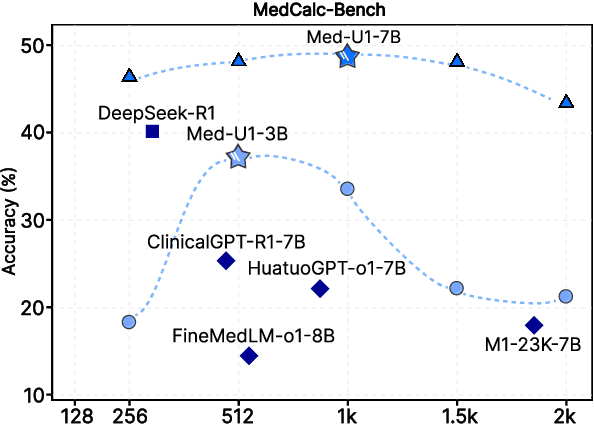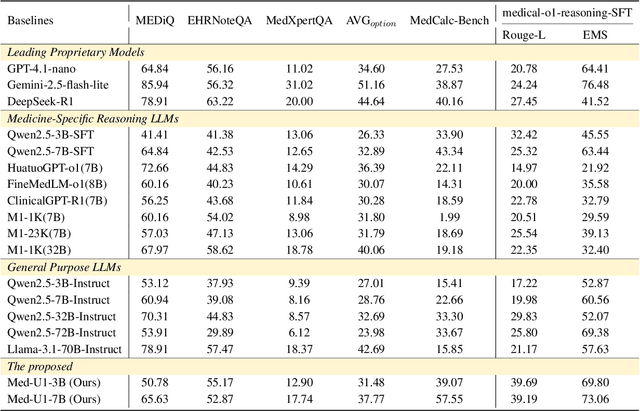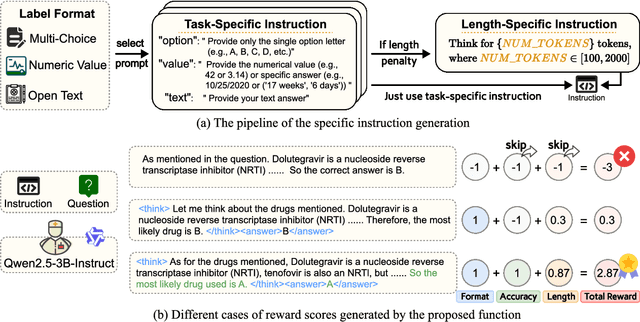Zhaopeng Feng
Datasets and Recipes for Video Temporal Grounding via Reinforcement Learning
Jul 24, 2025Abstract:Video Temporal Grounding (VTG) aims to localize relevant temporal segments in videos given natural language queries. Despite recent progress with large vision-language models (LVLMs) and instruction-tuning, existing approaches often suffer from limited temporal awareness and poor generalization. In this work, we introduce a two-stage training framework that integrates supervised fine-tuning with reinforcement learning (RL) to improve both the accuracy and robustness of VTG models. Our approach first leverages high-quality curated cold start data for SFT initialization, followed by difficulty-controlled RL to further enhance temporal localization and reasoning abilities. Comprehensive experiments on multiple VTG benchmarks demonstrate that our method consistently outperforms existing models, particularly in challenging and open-domain scenarios. We conduct an in-depth analysis of training strategies and dataset curation, highlighting the importance of both high-quality cold start data and difficulty-controlled RL. To facilitate further research and industrial adoption, we release all intermediate datasets, models, and code to the community.
Med-U1: Incentivizing Unified Medical Reasoning in LLMs via Large-scale Reinforcement Learning
Jun 14, 2025



Abstract:Medical Question-Answering (QA) encompasses a broad spectrum of tasks, including multiple choice questions (MCQ), open-ended text generation, and complex computational reasoning. Despite this variety, a unified framework for delivering high-quality medical QA has yet to emerge. Although recent progress in reasoning-augmented large language models (LLMs) has shown promise, their ability to achieve comprehensive medical understanding is still largely unexplored. In this paper, we present Med-U1, a unified framework for robust reasoning across medical QA tasks with diverse output formats, ranging from MCQs to complex generation and computation tasks. Med-U1 employs pure large-scale reinforcement learning with mixed rule-based binary reward functions, incorporating a length penalty to manage output verbosity. With multi-objective reward optimization, Med-U1 directs LLMs to produce concise and verifiable reasoning chains. Empirical results reveal that Med-U1 significantly improves performance across multiple challenging Med-QA benchmarks, surpassing even larger specialized and proprietary models. Furthermore, Med-U1 demonstrates robust generalization to out-of-distribution (OOD) tasks. Extensive analysis presents insights into training strategies, reasoning chain length control, and reward design for medical LLMs. The code will be released.
MT$^{3}$: Scaling MLLM-based Text Image Machine Translation via Multi-Task Reinforcement Learning
May 26, 2025



Abstract:Text Image Machine Translation (TIMT)-the task of translating textual content embedded in images-is critical for applications in accessibility, cross-lingual information access, and real-world document understanding. However, TIMT remains a complex challenge due to the need for accurate optical character recognition (OCR), robust visual-text reasoning, and high-quality translation, often requiring cascading multi-stage pipelines. Recent advances in large-scale Reinforcement Learning (RL) have improved reasoning in Large Language Models (LLMs) and Multimodal LLMs (MLLMs), but their application to end-to-end TIMT is still underexplored. To bridge this gap, we introduce MT$^{3}$, the first framework to apply Multi-Task RL to MLLMs for end-to-end TIMT. MT$^{3}$ adopts a multi-task optimization paradigm targeting three key sub-skills: text recognition, context-aware reasoning, and translation. It is trained using a novel multi-mixed reward mechanism that adapts rule-based RL strategies to TIMT's intricacies, offering fine-grained, non-binary feedback across tasks. Furthermore, to facilitate the evaluation of TIMT in authentic cross-cultural and real-world social media contexts, we introduced XHSPost, the first social media TIMT benchmark. Our MT$^{3}$-7B-Zero achieves state-of-the-art results on the latest in-domain MIT-10M benchmark, outperforming strong baselines such as Qwen2.5-VL-72B and InternVL2.5-78B by notable margins across multiple metrics. Additionally, the model shows strong generalization to out-of-distribution language pairs and datasets. In-depth analyses reveal how multi-task synergy, reinforcement learning initialization, curriculum design, and reward formulation contribute to advancing MLLM-driven TIMT.
CP-Router: An Uncertainty-Aware Router Between LLM and LRM
May 26, 2025Abstract:Recent advances in Large Reasoning Models (LRMs) have significantly improved long-chain reasoning capabilities over Large Language Models (LLMs). However, LRMs often produce unnecessarily lengthy outputs even for simple queries, leading to inefficiencies or even accuracy degradation compared to LLMs. To overcome this, we propose CP-Router, a training-free and model-agnostic routing framework that dynamically selects between an LLM and an LRM, demonstrated with multiple-choice question answering (MCQA) prompts. The routing decision is guided by the prediction uncertainty estimates derived via Conformal Prediction (CP), which provides rigorous coverage guarantees. To further refine the uncertainty differentiation across inputs, we introduce Full and Binary Entropy (FBE), a novel entropy-based criterion that adaptively selects the appropriate CP threshold. Experiments across diverse MCQA benchmarks, including mathematics, logical reasoning, and Chinese chemistry, demonstrate that CP-Router efficiently reduces token usage while maintaining or even improving accuracy compared to using LRM alone. We also extend CP-Router to diverse model pairings and open-ended QA, where it continues to demonstrate strong performance, validating its generality and robustness.
CompBench: Benchmarking Complex Instruction-guided Image Editing
May 18, 2025Abstract:While real-world applications increasingly demand intricate scene manipulation, existing instruction-guided image editing benchmarks often oversimplify task complexity and lack comprehensive, fine-grained instructions. To bridge this gap, we introduce, a large-scale benchmark specifically designed for complex instruction-guided image editing. CompBench features challenging editing scenarios that incorporate fine-grained instruction following, spatial and contextual reasoning, thereby enabling comprehensive evaluation of image editing models' precise manipulation capabilities. To construct CompBench, We propose an MLLM-human collaborative framework with tailored task pipelines. Furthermore, we propose an instruction decoupling strategy that disentangles editing intents into four key dimensions: location, appearance, dynamics, and objects, ensuring closer alignment between instructions and complex editing requirements. Extensive evaluations reveal that CompBench exposes fundamental limitations of current image editing models and provides critical insights for the development of next-generation instruction-guided image editing systems.
MT-R1-Zero: Advancing LLM-based Machine Translation via R1-Zero-like Reinforcement Learning
Apr 14, 2025Abstract:Large-scale reinforcement learning (RL) methods have proven highly effective in enhancing the reasoning abilities of large language models (LLMs), particularly for tasks with verifiable solutions such as mathematics and coding. However, applying this idea to machine translation (MT), where outputs are flexibly formatted and difficult to automatically evaluate with explicit rules, remains underexplored. In this work, we introduce MT-R1-Zero, the first open-source adaptation of the R1-Zero RL framework for MT without supervised fine-tuning or cold-start. We propose a rule-metric mixed reward mechanism to guide LLMs towards improved translation quality via emergent reasoning. On the WMT 24 English-Chinese benchmark, our MT-R1-Zero-3B-Mix achieves competitive performance, surpassing TowerInstruct-7B-v0.2 by an average of 1.26 points. Meanwhile, our MT-R1-Zero-7B-Mix attains a high average score of 62.25 across all metrics, placing it on par with advanced proprietary models such as GPT-4o and Claude-3.5-Sonnet, while the MT-R1-Zero-7B-Sem variant achieves state-of-the-art scores on semantic metrics. Moreover, our work exhibits strong generalization capabilities on out-of-distribution MT tasks, robustly supporting multilingual and low-resource settings. Extensive analysis of model behavior across different initializations and reward metrics offers pioneering insight into the critical role of reward design, LLM adaptability, training dynamics, and emergent reasoning patterns within the R1-Zero paradigm for MT. Our code is available at https://github.com/fzp0424/MT-R1-Zero.
MT-RewardTree: A Comprehensive Framework for Advancing LLM-Based Machine Translation via Reward Modeling
Mar 15, 2025Abstract:Process reward models (PRMs) have shown success in complex reasoning tasks for large language models (LLMs). However, their application to machine translation (MT) remains underexplored due to the lack of systematic methodologies and evaluation benchmarks. To address this gap, we introduce \textbf{MT-RewardTree}, a comprehensive framework for constructing, evaluating, and deploying process reward models in MT. Unlike traditional vanilla preference pair construction, we propose a novel method for automatically generating token-level preference pairs using approximate Monte Carlo Tree Search (MCTS), which mitigates the prohibitive cost of human annotation for fine-grained steps. Then, we establish the first MT-specific reward model benchmark and provide a systematic comparison of different reward modeling architectures, revealing that token-level supervision effectively captures fine-grained preferences. Experimental results demonstrate that our MT-PRM-Qwen-2.5-3B achieves state-of-the-art performance in both token-level and sequence-level evaluation given the same input prefix. Furthermore, we showcase practical applications where PRMs enable test-time alignment for LLMs without additional alignment training and significantly improve performance in hypothesis ensembling. Our work provides valuable insights into the role of reward models in MT research. Our code and data are released in \href{https://sabijun.github.io/MT_RewardTreePage/}{https://sabijun.github.io/MT\_RewardTreePage}.
M-MAD: Multidimensional Multi-Agent Debate Framework for Fine-grained Machine Translation Evaluation
Dec 28, 2024



Abstract:Recent advancements in large language models (LLMs) have given rise to the LLM-as-a-judge paradigm, showcasing their potential to deliver human-like judgments. However, in the field of machine translation (MT) evaluation, current LLM-as-a-judge methods fall short of learned automatic metrics. In this paper, we propose Multidimensional Multi-Agent Debate (M-MAD), a systematic LLM-based multi-agent framework for advanced LLM-as-a-judge MT evaluation. Our findings demonstrate that M-MAD achieves significant advancements by (1) decoupling heuristic MQM criteria into distinct evaluation dimensions for fine-grained assessments; (2) employing multi-agent debates to harness the collaborative reasoning capabilities of LLMs; (3) synthesizing dimension-specific results into a final evaluation judgment to ensure robust and reliable outcomes. Comprehensive experiments show that M-MAD not only outperforms all existing LLM-as-a-judge methods but also competes with state-of-the-art reference-based automatic metrics, even when powered by a suboptimal model like GPT-4o mini. Detailed ablations and analysis highlight the superiority of our framework design, offering a fresh perspective for LLM-as-a-judge paradigm. Our code and data are publicly available at https://github.com/SU-JIAYUAN/M-MAD.
EC-Guide: A Comprehensive E-Commerce Guide for Instruction Tuning and Quantization
Aug 06, 2024Abstract:Large language models (LLMs) have attracted considerable attention in various fields for their cost-effective solutions to diverse challenges, especially with advancements in instruction tuning and quantization. E-commerce, with its complex tasks and extensive product-user interactions, presents a promising application area for LLMs. However, the domain-specific concepts and knowledge inherent in e-commerce pose significant challenges for adapting general LLMs. To address this issue, we developed EC-Guide \href{https://github.com/fzp0424/EC-Guide-KDDUP-2024}, a comprehensive e-commerce guide for instruction tuning and quantization of LLMs. We also heuristically integrated Chain-of-Thought (CoT) during inference to enhance arithmetic performance. Our approach achieved the 2nd place in Track 2 and 5th place in Track 5 at the Amazon KDD Cup'24 \href{https://www.aicrowd.com/challenges/amazon-kdd-cup-2024-multi-task-online-shopping-challenge-for-llms}. Additionally, our solution is model-agnostic, enabling effective scalability across larger systems.
Ladder: A Model-Agnostic Framework Boosting LLM-based Machine Translation to the Next Level
Jun 22, 2024Abstract:General-purpose Large Language Models (LLMs) like GPT-4 have achieved remarkable advancements in machine translation (MT) by leveraging extensive web content. On the other hand, translation-specific LLMs are built by pre-training on domain-specific monolingual corpora and fine-tuning with human-annotated translation data. Despite the superior performance, these methods either demand an unprecedented scale of computing and data or substantial human editing and annotation efforts. In this paper, we develop Ladder, a novel model-agnostic and cost-effective tool to refine the performance of general LLMs for MT. Ladder is trained on pseudo-refinement triplets which can be easily obtained from existing LLMs without additional human cost. During training, we propose a hierarchical fine-tuning strategy with an easy-to-hard schema, improving Ladder's refining performance progressively. The trained Ladder can be seamlessly integrated with any general-purpose LLMs to boost their translation performance. By utilizing Gemma-2B/7B as the backbone, Ladder-2B can elevate raw translations to the level of top-tier open-source models (e.g., refining BigTranslate-13B with +6.91 BLEU and +3.52 COMET for XX-En), and Ladder-7B can further enhance model performance to be on par with the state-of-the-art GPT-4. Extensive ablation and analysis corroborate the effectiveness of Ladder in diverse settings. Our code is available at https://github.com/fzp0424/Ladder
 Add to Chrome
Add to Chrome Add to Firefox
Add to Firefox Add to Edge
Add to Edge